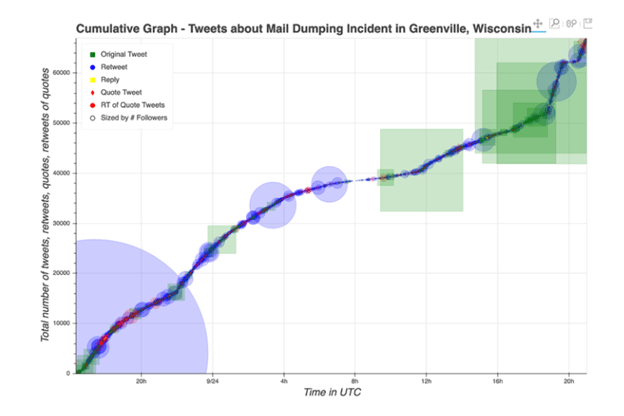In July, the University of Washington’s Center for an Informed Public joined forces with the Stanford Internet Observatory, the Atlantic Council’s Digital Forensics Lab and network analysis firm Graphika to stand up a nonpartisan rapid-response analysis team, the Election Integrity Partnership, to detect and mitigate the impact of attempts to prevent or deter people from voting or to delegitimize election results.
As voters across the United States prepare to participate in federal, state and local elections in November — or pursue early voting or options for absentee or mail-in balloting — a team of CIP researchers, staff members and UW students, including postdoctoral scholars, PhD students, master’s students and undergraduate research assistants, has been incredibly busy with Election Integrity Partnership monitoring and analysis work.
Recent highlights of CIP contributions to EIP analysis work include:
- A deep-dive analysis into how emerging social media narratives around two recent mail-dumping incidents (in Glendale, California and Greenville, Wisconsin) were framed, shaped, shared and amplified online. A key takeaway: “It’s important to raise awareness of the misleading nature of these patterned narratives and to help the public understand who is mobilizing these false narratives and how.”
- A similar social media analysis of a debunked ballot-dumping incident in Sonoma County, California found that although there was some foreign amplification, domestic accounts — including verified, blue-check Twitter accounts — were major spreaders and promoters of misinformation narratives.
- Tracking a low-engagement, cross-platform misinformation narrative regarding vote-by-mail processes in California which shows how “follow-for-follow communities” on Twitter “are an important phenomenon in the spread of misinformation as they create a vehicle for increased engagement.”
- Examining misinformation about absentee ballot request forms that had “circulated on at least seven social media platforms from mid-August to mid-September.”
- Studying misleading online ads that highlight a loophole in Google’s policies, including how “advertisers are using misleading clickbait headlines to put partisan political content in front of users.”
The Election Integrity Partnership’s work was recently praised by The New York Times editorial board, which has called on tech companies to create a “clear, explicit framework for what qualifies as electoral misinformation and disinformation,” adding that for a template, “they could look to the work of the Election Integrity Partnership, which built a framework for grading Big Tech’s election security policies and has determined ‘that few platforms have comprehensive policies on election-related content.’”



